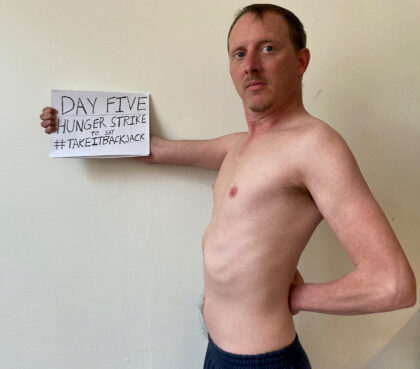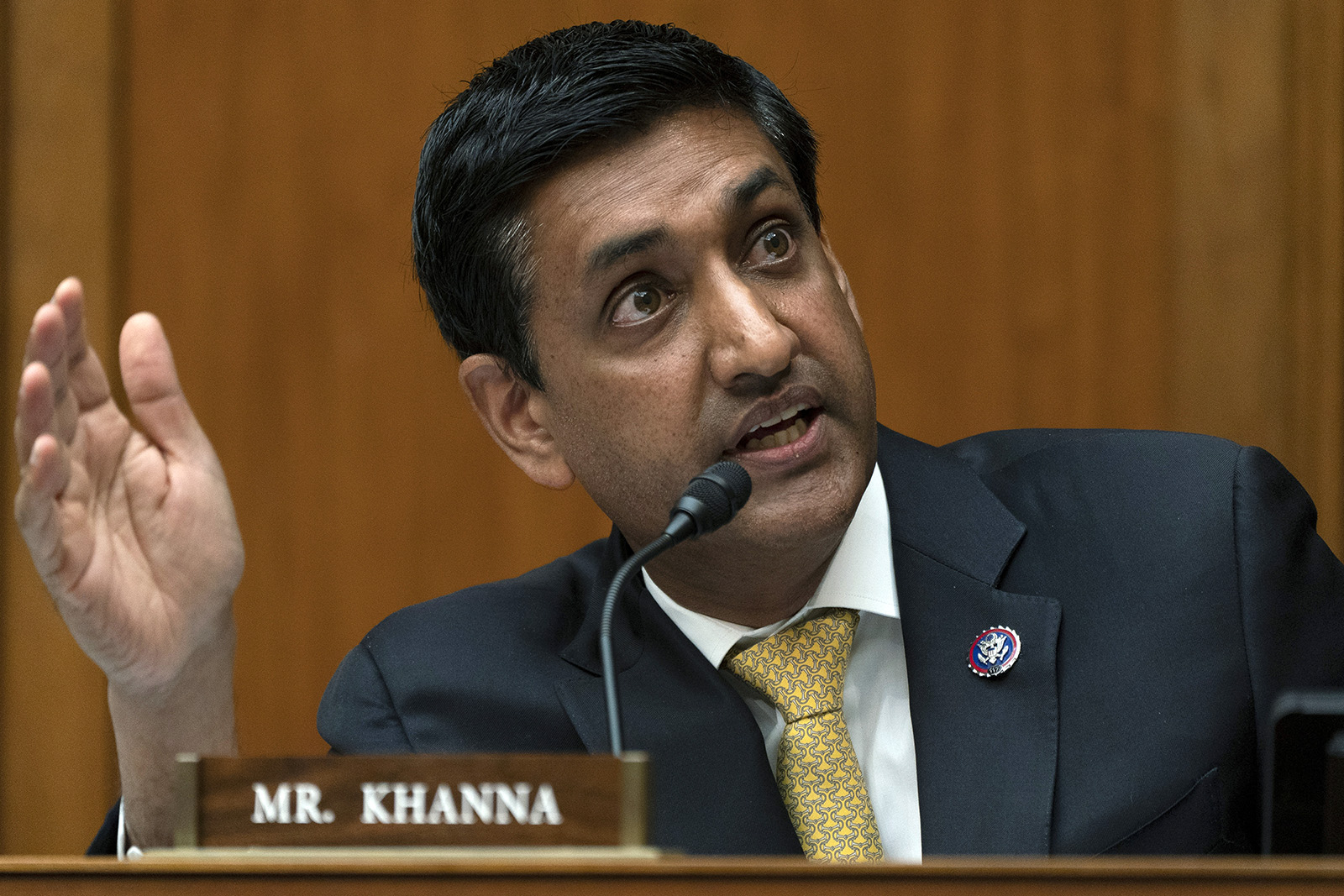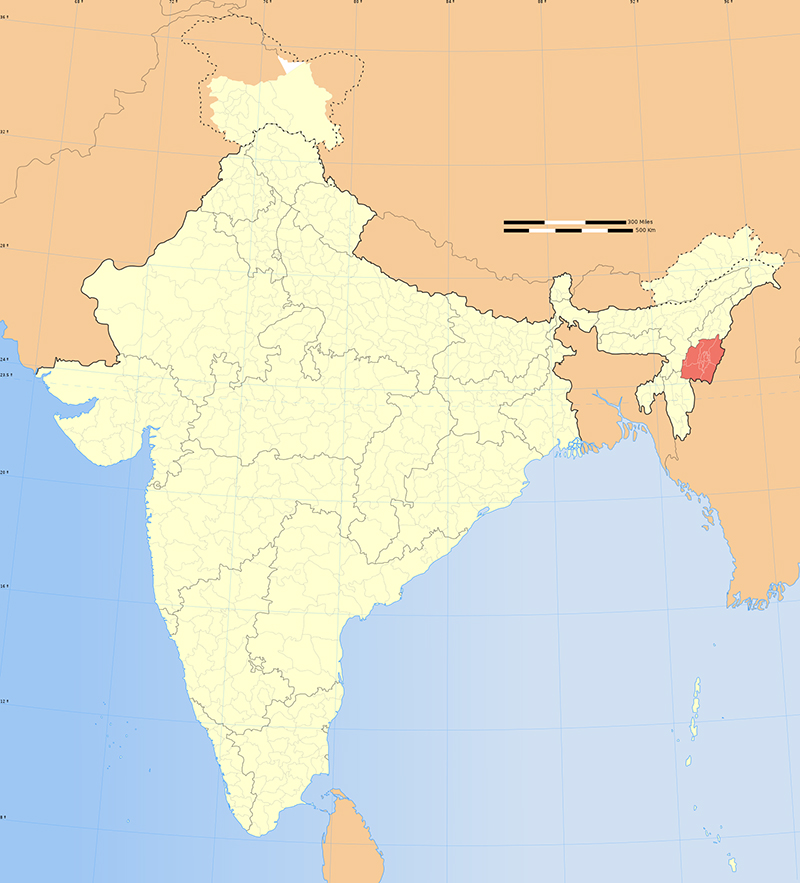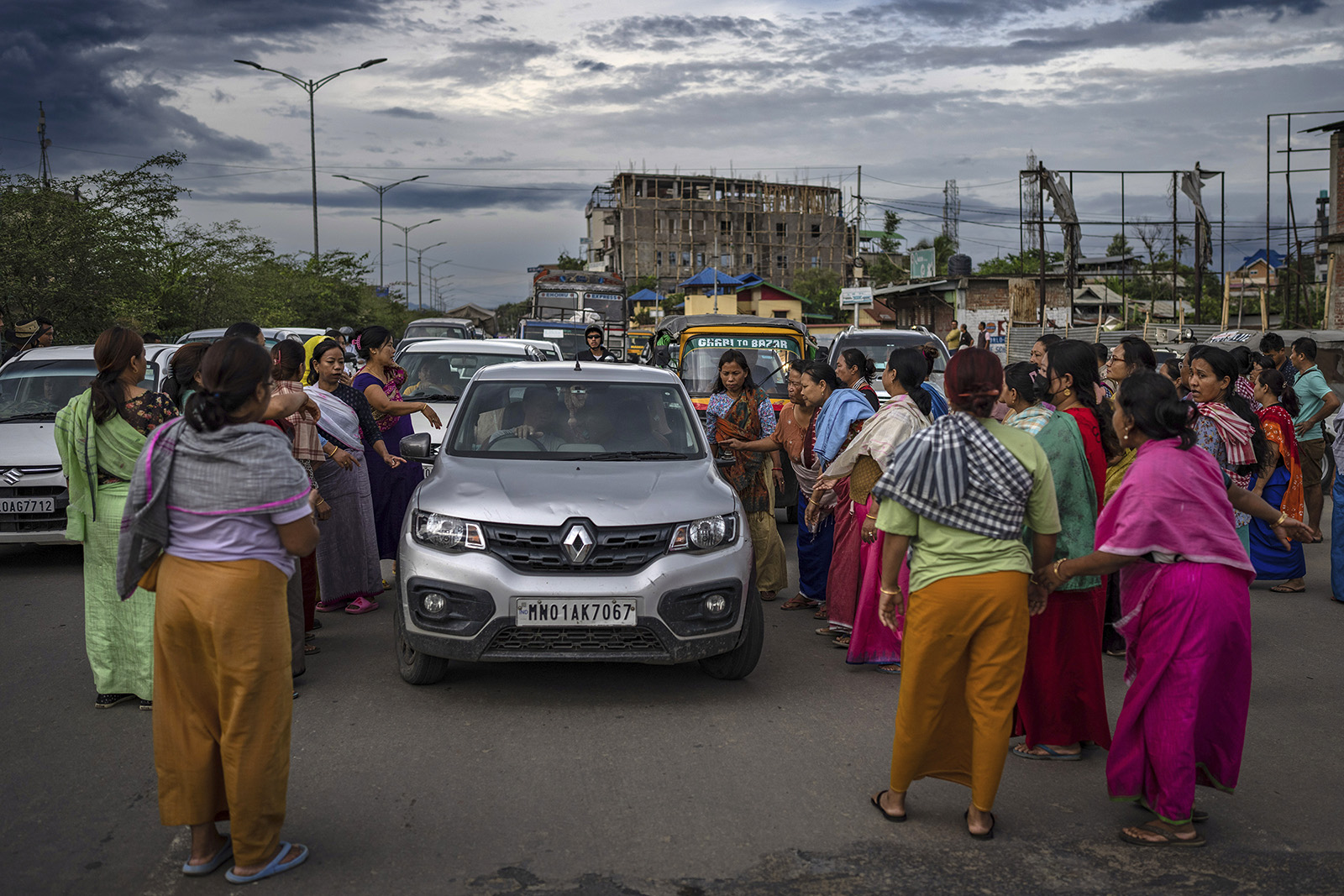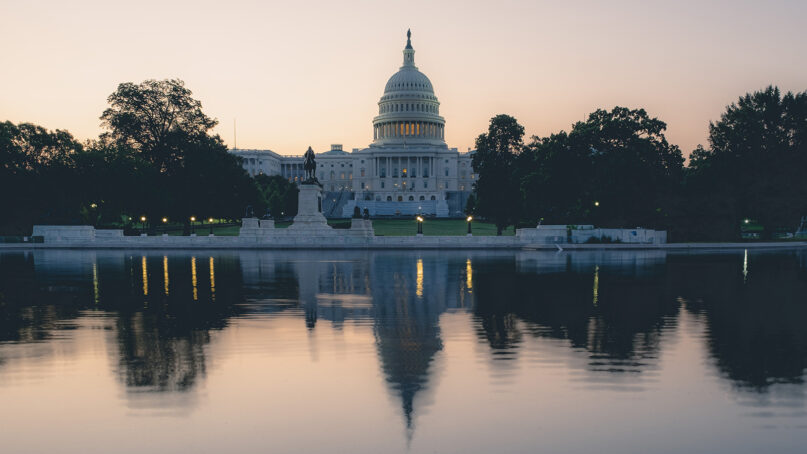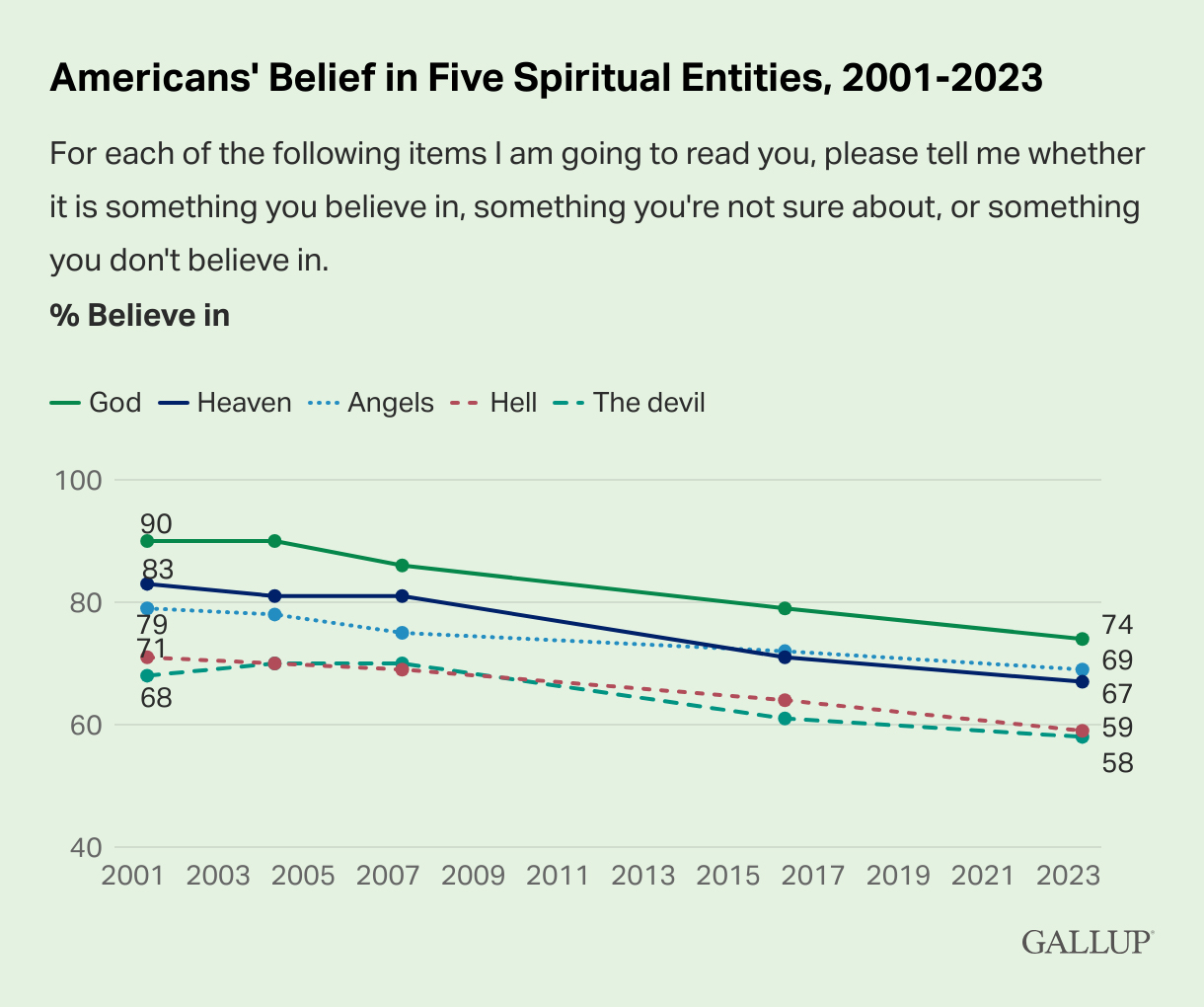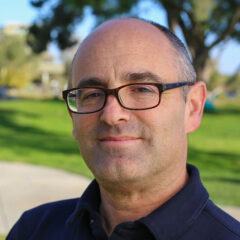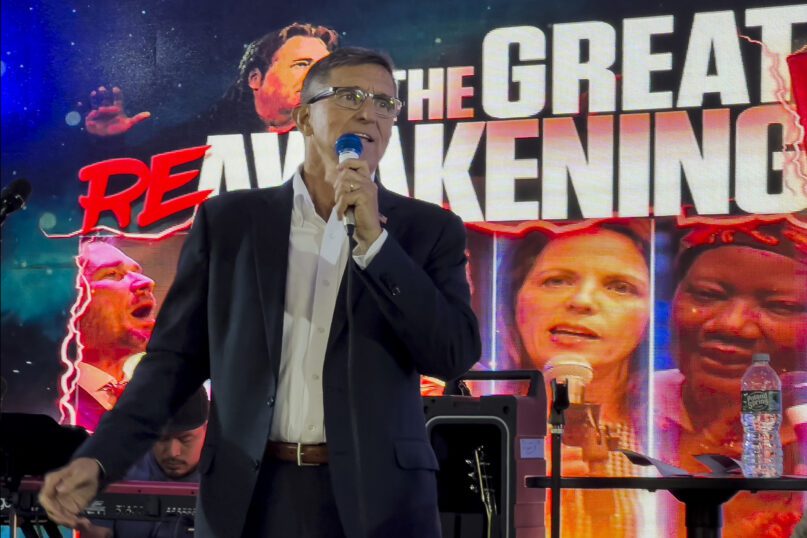Written in Protest
Let’s review: Slavery benefited white people
We’re not done covering the basics of anti-racism in America. Even some Black people are confused.
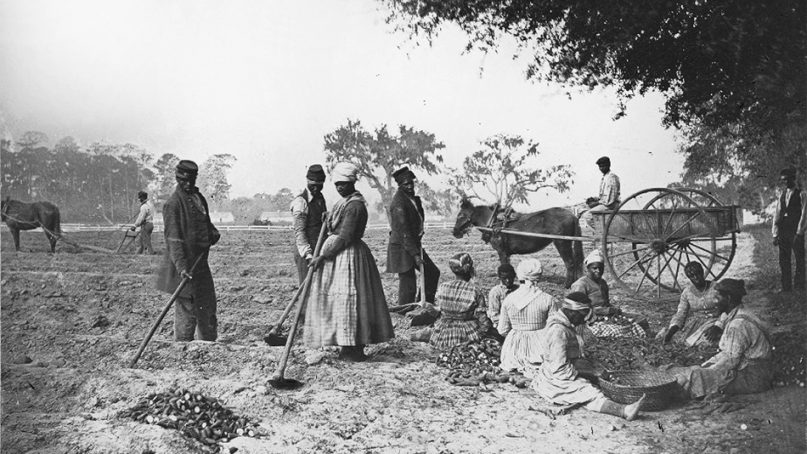
(RNS) — In the years since the killing of George Floyd, it has felt at times as though anti-racism is stuck in a feedback loop. We shout the same truth claims to burned-out supporters and entrenched opposers. Is it still really necessary, I ask myself, to repeat the A-B-C’s of social justice?
Apparently it is. We’re not done covering the basics of anti-racism in America. Even some Black people are confused.
“Where would you be today without slavery?” Kim Klacik, a Black woman and former Maryland Republican congressional candidate, asked talk show host Marc Lamont Hill in a recent interview on theGrio.com.
In response, Hill, a Temple University professor, said the question ignores the fact that many Africans had thriving societies of their own. Second, he pointed out that Klacik’s question implies that Black people are collectively better off for having been enslaved.
The conversation degenerates from there, with Klacik mindbendingly claiming that trouble spots in Africa today give a picture of what life would be like for the African diaspora if slavers had not claimed them.
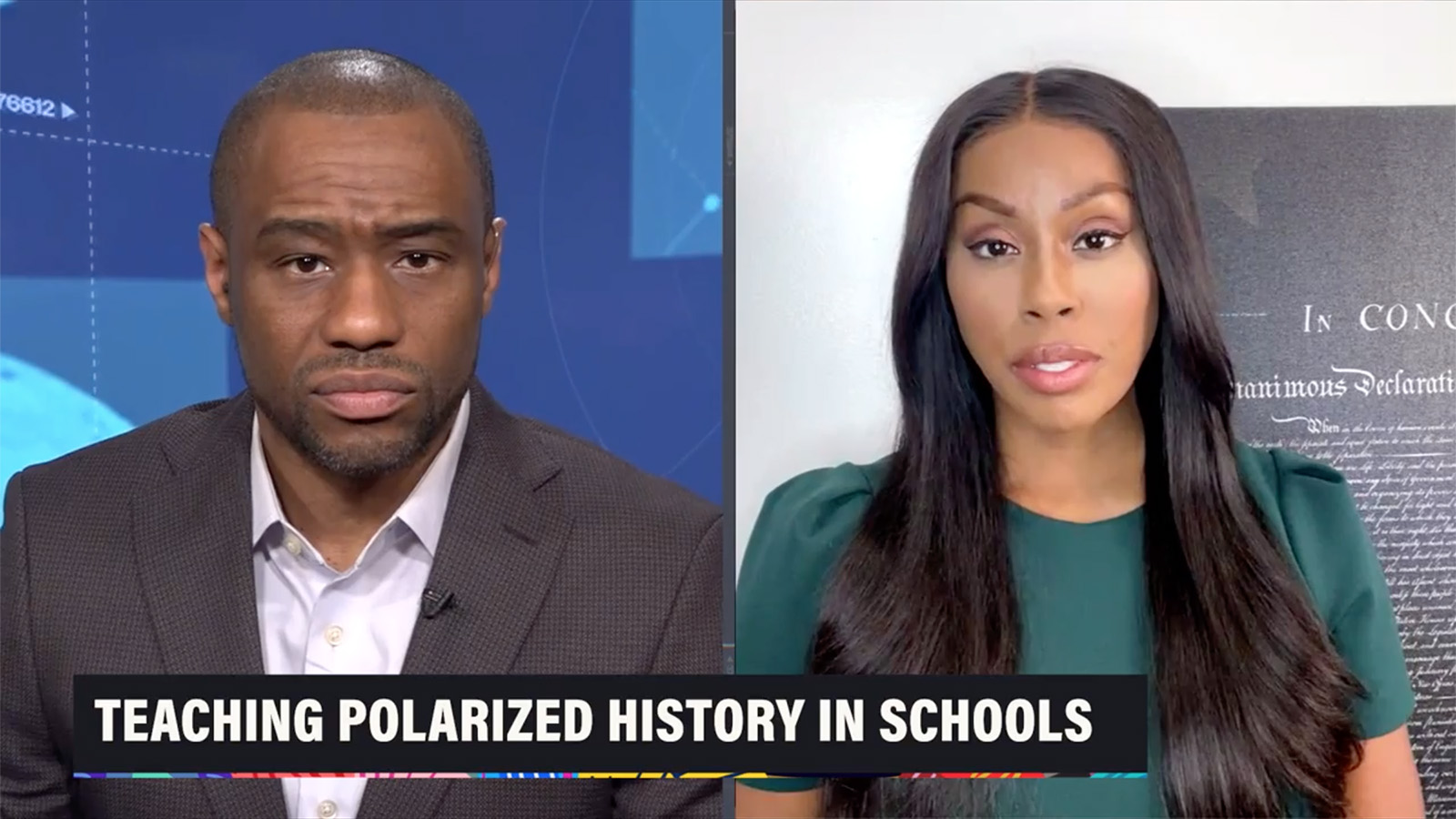
Host Marc Lamont Hill, left, and Kim Klacik during an interview on TheGrio.com. Video screen grab
So let’s review: The primary benefactors of slavery are white people. Period.
It is an irrefutable fact of history that the West was built on slave labor. Our ancestors were brought to the so-called New World to work, and their labor produced lucrative commodities such as tobacco, sugar, coffee, tea and rum that helped these nations grow wealthy. The enslaved built infrastructure: universities, churches, railroads and even the White House itself.
That past is the story of how we got to the present. If you can celebrate the fact that Thomas Jefferson’s penning the Declaration of Independence in 1776 led to the creation of the United States, you can understand that the theft of trillions of dollars in labor from enslaved African captives led to the wealth gap between Black and white America to this day.
What wealth gap? According to the Federal Reserve, white America held $124.5 trillion in assets in 2022, while Black America held less than $8 trillion. Even accounting for the relative numbers of each group, the gap is real and inextricably linked to the trillions of dollars of wealth stolen in labor and resources from African-descended peoples and nations.
Monetary wealth is just one measure. Due to a combination of environmental racism, discrimination in health care, discrimination in criminal justice and a general anti-Black bias that leads to stress-related disease, researchers have been monitoring a fluctuating Black-white life-expectancy gap for years. According to numerous studies, white Americans generally live longer than their Black counterparts.
JAMA, a respected medical journal, reported that the unequal structure of American society is responsible for the phenomenon known as “excess death” in Black communities:
That includes access to quality schools, jobs with a living wage, housing in safe neighborhoods, health insurance and medical care — all of which affect health and well-being. For centuries, Black people were legally deprived of these benefits, and researchers said we have yet to fully remediate the effects.
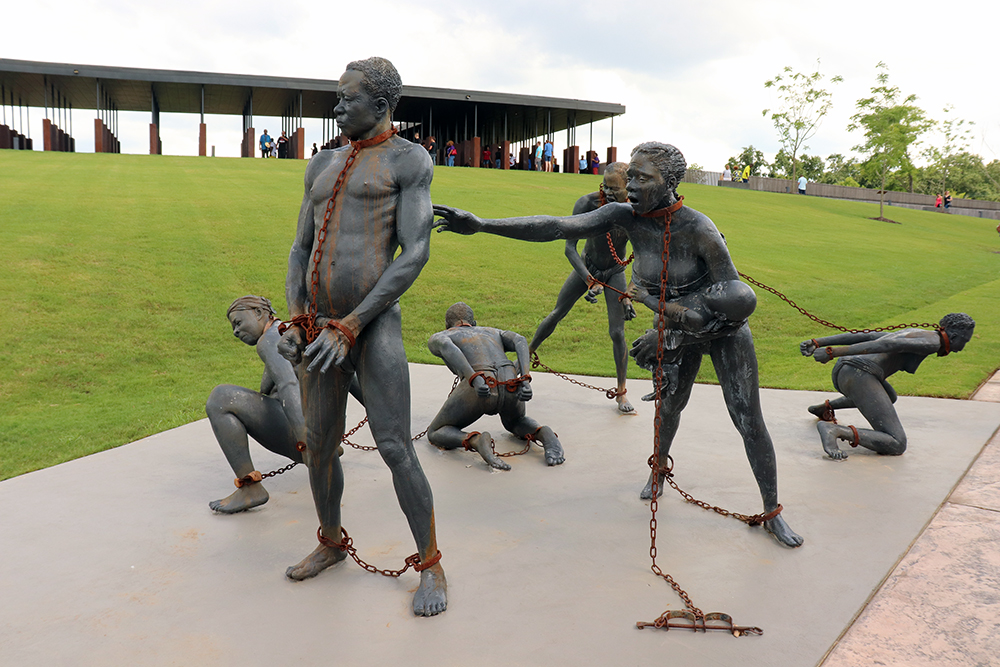
An art installation of slaves at the National Memorial for Peace and Justice by artist Kwame Akoto-Bamfo in Montgomery, Alabama. RNS photo by Adelle M. Banks
The advantages for white people extend to the intangible. Every year, the white nations who participated in the Atlantic slave trade are overrepresented among the top 20 countries in the World Happiness Index — probably because colonization left the colonizers’ descendants with greater access to means for well-being. In every nation their predecessors built through slave labor, they own most of the land and businesses.
The well-being gap seems to be directly related to racial difference. A Brookings study showed that Black and Asian Americans experienced sharp declines in well-being in 2016 and 2020 respectively — both years in which overt anti-Black and anti-Asian racism in the U.S. increased. That same study reports:
Since 2020, all racial and ethnic groups experienced a sharp drop in the percentage of adults thriving, consistent with the Gallup World Poll summary data. Asian-Americans saw the sharpest decline, which aligns with the rise in anti-Asian hate. During this period, non-Hispanic white Americans registered the highest rates of thriving.
Is it any wonder? Slavery left white people the psychological boon of presumed racial superiority, abetted by a galling, incurious innocence.
That innocence and incuriosity has penetrated even to Klacik, as she betrays in her chat on TheGrio with Hill, who is at pains to acquaint her with the idea that white colonialism had some part in African nations’ status today.
After the Atlantic slave trade was abolished, Europeans set their sights on dominating Africa, exploiting the continent well into the 20th century, enriching itself by extracting African resources and oppressing African peoples for centuries. With the exception of Ethiopia, the African continent was subjected to oppressive white rule, and the countries Europeans largely created are still dealing with the economic, cultural and political ramifications today.
“In country after country we see white men building empires on the sweat and suffering of colored people,” boomed Martin Luther King Jr. in 1967.
Are we better off? Do Black people enjoy to some degree the benefits of Western civilization? Perhaps, but they came with untold amounts of unnecessary violence, from which we haven’t recovered yet.
Opinion
Florida’s new curriculum echoes the paternalist theology of the Lost Cause
The doctrine that touts slavery's 'benefits' for its victims was once used to sanctify segregation.
(RNS) — As students head back to school this week, Florida students are in for big changes. Claiming to support “parental rights” and wishing to “build great families,” the state’s Board of Education approved a new K-12 social studies curriculum that suggests that slavery had “personal benefit” for enslaved people and crediting white men primarily with liberating them.
We should not be surprised that conservative Christian activists on the board, including those appointed by Governor Ron DeSantis, voted in these changes. History education has long been a target of white Christian nationalists inside and outside schools, and schools have long been instruments for those intent on shaping our ideas about American identity and solidifying white Christian power in a country that is no longer majority white and Christian.
After the Civil War, white Christians in the South refashioned the theology that had justified slavery into the Lost Cause. They recast defeated Confederates as noble patriots, while depicting African Americans as too immature to carry out the duties of citizenship. They used faith to suggest that the natural order had been upset. In 1876, the Rev. Benjamin Palmer, a Presbyterian minister in New Orleans, wrote that “involuntary servitude” was God’s way of protecting society from “the monotony of equality.”
The inventors of the Lost Cause also invented new histories that suited their white supremacist views, which dominated history textbooks, classrooms and pulpits across the U.S. from the 1890s through the 1960s, only unraveling through decades of civil rights activism.
Florida’s new history standards echo these lies, teaching children debunked ideas such as the notion that enslaved people benefited from their lot. This benevolent paternalism reinforced Palmer’s idea that white men should wield power to govern others for their own good and the good of all. White Christians saw paternalism as Christian doctrine because it aligned with New Testament instructions for slaves to obey masters and wives to obey husbands. Paternalism claimed that, just as slavery had been good for enslaved people, so, too, was Jim Crow segregation, which dictated that only white men should vote.
At the start of the 1890 Mississippi Constitutional Convention — convened to disenfranchise Black men — Methodist Bishop Charles Galloway prayed that “the heritage of virtue and liberty” of Mississippi’s past slaveholding leaders would supply “courage,” “statesmanship” and “patriotic citizenship” for the delegates — all but one of whom were white. As the convention settled on poll taxes and literacy tests to limit Black voting rights, they paused for a day of prayer in local white churches to ask God’s blessing on their new constitution.
Mississippi thus became a model for disenfranchisement across the South until the 1965 Voting Rights Act overturned its measures. Even then, Christian white supremacists argued that white male political control was best for Black citizens.
A key part of creating segregation was to discount the power wielded by free Black communities. After emancipation, African Americans built churches that housed schools, community meetings and voter education. In 1872, the African Methodist Episcopal Church met in Nashville and urged Congress to pass pending civil rights legislation so that “every citizen of this republic shall be secure in … all rights in all of the states, irrespective of race.” Lest Congress underestimate the voting power of “the largest body of Christians of the African race in the country,” they warned that the “influence and energies” of their nearly 400,000 members would support the political party “which shall guarantee to our race those sacred rights.”
White Christians denounced Black Christians’ defense of their rights as manipulation by Northern white politicians. Lost Cause history books removed all evidence of Black self-determination.
Florida’s new guidelines also remove African Americans from history. Middle school students will learn about “figures who strove to abolish the institution of slavery” — all of whom are white men. The Reconstruction figures whom the curriculum highlights are all white men, with the lone exception of Frederick Douglass. Naming white leaders as the most important people shaping African American freedom and self-determination undermines not only the vibrant history of Black communities, but their very fight for autonomy.
Most perniciously, perhaps, Florida’s new social studies standards whitewash white violence against Black communities, just as the Lost Cause histories did.
In the late 1800s, white leaders framed violence by the Ku Klux Klan and lynch mobs as appropriate responses to actions by African Americans. In 1875, Mississippi’s statewide election was notorious for white mob violence against would-be Black voters. When the federal government refused requests from Black communities for help, white supremacist candidates unsurprisingly won.
On the Sunday after the election, the Rev. John Jones, a Methodist minister and former enslaver, preached a sermon praising the election results as “our victory” for which his congregants should praise God. The horrifying violence was portrayed as merely work for a righteous cause.
Today, white supremacist violence is not justified in itself, but children will be taught that both sides can be blamed for massacres of Black citizens with the claim that both sides acted violently. For instance Florida’s teachers will be called on to present the 1921 Tulsa Massacre as “violence perpetrated against and by African Americans.” In fact in Tulsa, as in too many other places, white mobs destroyed Black lives, homes and businesses with impunity. A judge recently rejected claims of the last living Tulsa survivors for restitution.
In making changes in K-12 and higher education, Florida officials have followed the lead of Hillsdale College’s new K-12 1776 Curriculum. But these false ideas have garnered widespread approval for generations
We should all be no less alarmed that they are reemerging now. It took decades of activism growing out of the Civil Rights Movement to expose the false premises of these invented narratives. All of us — parents, voters, educators and citizens at large — must commit to learning more about our nation’s history ourselves and pushing for our schools to teach truthful histories to school children. We cannot allow such dangerous histories to become accepted once again.
(Elizabeth Jemison is an associate professor of religion at Clemson University and author of “Christian Citizens: Reading the Bible in Black and White in the Postemancipation South.” The views expressed in this commentary do not necessarily reflect those of Religion News Service.)

